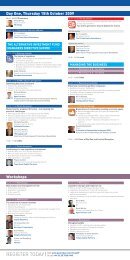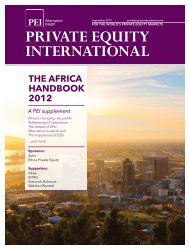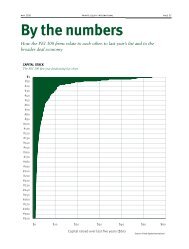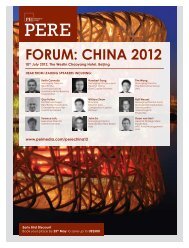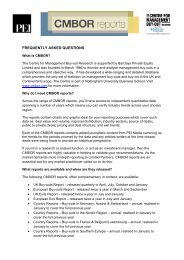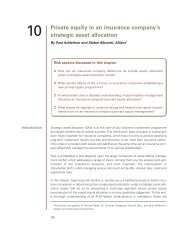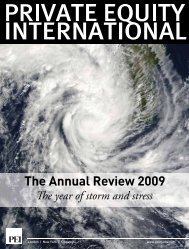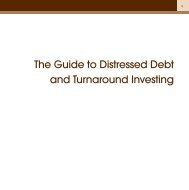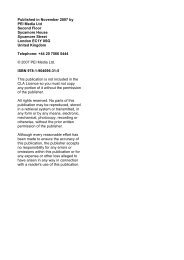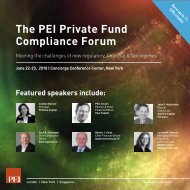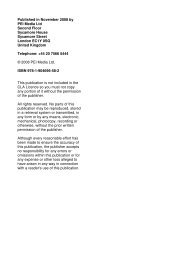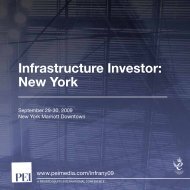THE ANNUAL REVIEW 2010 - PEI Media
THE ANNUAL REVIEW 2010 - PEI Media
THE ANNUAL REVIEW 2010 - PEI Media
You also want an ePaper? Increase the reach of your titles
YUMPU automatically turns print PDFs into web optimized ePapers that Google loves.
private equity annual review <strong>2010</strong> pa g e 81<br />
t e r m s & c o n d i t i o n s<br />
Terms tug of war<br />
The push-pull between fund managers and investors over<br />
terms and conditions may not have been as dramatic as<br />
some assumed, finds Nicholas Donato<br />
Limited partners’ rising negotiating power<br />
on terms and conditions was discussed frequently<br />
in 2009 and <strong>2010</strong>.Tougher fundraising<br />
conditions, more GPs needing to<br />
replenish dry powder and LP-friendly terms<br />
and conditions guidelines released by the<br />
Institutional Limited Partners Association<br />
were all said to have given LPs the upper<br />
hand in many cases.<br />
But a study released last year by New<br />
York-headquartered law firm Debevoise<br />
& Plimpton found there had been no<br />
“substantial shift” in terms in the past five<br />
years. The study examined more than 200<br />
buyout funds globally, comparing the key<br />
financial and legal terms of funds that had<br />
final closing prior to the financial crisis, with<br />
those closed post-crisis.<br />
“LPs and their advisors are vigorously<br />
negotiating fund terms these days, in many cases<br />
citing the ILPA [guidelines] to support their<br />
arguments,” the report acknowledged, adding<br />
there was, however, little evidence of an overall<br />
industry-wide shift of power towards LPs.<br />
The study measured nine key economic<br />
terms of buyout funds: the timing of<br />
carried interest distributions; carried<br />
interest percentages, preferred return<br />
rates; management fees both during and<br />
after the investment period; sharing of<br />
transaction and other fees; joint and several<br />
guarantees on GP clawback provisions;<br />
interim clawback provisions; and after-tax<br />
calculations on clawbacks.<br />
On most demands, including the timing<br />
of carried interest distributions and carry<br />
points, little concession was found to have<br />
been made on the part of GPs.<br />
giving way<br />
LPs did however gain ground on a few<br />
issues highlighted by ILPA – most notably<br />
on transaction and management fee reductions<br />
or offsets.<br />
The Debevoise study found many GPs<br />
gave way on management fee “step downs”,<br />
which had been long-demanded by investors<br />
who argue that reduced management fees<br />
after the wind-down of a fund’s investment<br />
period reflect lower operating costs.<br />
Large funds raised after the crisis – those<br />
of $2 billion or more – had post-investment<br />
period management fees of on average 1.1<br />
percent. Those raised before the crisis charged<br />
a fee of 1.24 percent. For smaller funds, the<br />
post-crisis funds charged 1.73 percent in<br />
management fees after the investment period.<br />
Pre-crisis funds charged 1.81 percent.<br />
Concessions were also made on the<br />
handling of fee offsets, which occur when<br />
a GP reduces or cancels management fees as<br />
a result of receiving income from break-up<br />
fees, transaction and/or monitoring fees<br />
Show of strength: GPs and LPs in<br />
<strong>2010</strong> continued to negotiate hard<br />
on terms<br />
charged to portfolio companies.<br />
Also found more prevalent in post-crisis<br />
funds were more LP-friendly clawback<br />
provisions, which allowed fund investors<br />
to recover money in the event GPs receive<br />
too much carried interest – such as when<br />
managers receive carry on successful exits<br />
early in the fund’s life. In noting ILPA’s<br />
recommendation that GPs should make any<br />
necessary clawback payments within two<br />
years, as opposed to waiting until the fund<br />
completes its last exit, the study revealed<br />
16 percent of the sample funds now provide<br />
for the provision compared to the lesser<br />
10 percent of funds offering the provision<br />
raised during the boom years.<br />
While many GPs have given in to LP<br />
demands on fees, however, it may not be<br />
enough. For instance the California Public<br />
Employees’ Retirement System (CalPERS),<br />
a trendsetter in the LP community in terms<br />
of negotiations with fund managers, has<br />
indicated it may push for incentive-based<br />
fees rather than flat management fees.<br />
Should that proposal become policy,<br />
there will no doubt be further friction<br />
between LPs and GPs on the fee front. But<br />
is that such a bad thing? After all, a leaner,<br />
hungrier group of smart, hardworking<br />
managers who merit their fees is good for<br />
the industry as a whole – not just CalPERS.<br />
The squeaky wheel complaint from LPs of<br />
GPs growing fat on fees gets jettisoned and<br />
instead there is an unambiguous alignment<br />
of interest. No more “heads I win, tails you<br />
lose” as one fund formation lawyer recently<br />
put it to <strong>PEI</strong>. n



